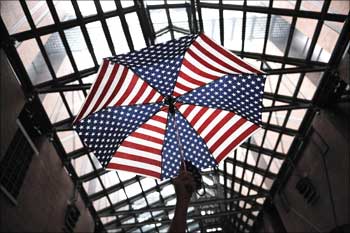 The Indo-US defence relationship may now get personal attention with strong India-backer Ashton Carter today being nominated by President Barack Obama for the key post of the defence secretary.
The Indo-US defence relationship may now get personal attention with strong India-backer Ashton Carter today being nominated by President Barack Obama for the key post of the defence secretary.
A close confidant of Obama, Carter, 60, has served in his administration, in particular at the Pentagon in various capacities -- the last being that of the Deputy Secretary of Defence, from October 2011 to December 2013.
It is in this capacity that he was also the Pentagon's point person on India when he launched the path breaking Defence Trade and Technology Initiative.
Also called the Carter-Menon initiative, Carter during his travel to India in September 2013 had submitted a list of more than a dozen hi-tech defence items for co-production and co-development with India.
India and the US are "destined to be partners" at the world stage and the Indo-US defence ties should move from an existing "buyer-seller" relationship to that of "co-production" and "co-development", Carter said last year.
"My view is that the United States and India are destined to be partners on the world stage. And that's because we share so many common interests, but I think fundamentally it's because we share so many common values," Carter had said ahead of his all-important trip to India in 2013.
Given that in his speeches, testimonies before key Congressional committees and op-eds in well know journals, he has tirelessly advocated for strengthening of defence and strategic relationship with India, it is for the first time in independent India that Indo-US defence relationship would attract personal interest from a US defence secretary.
Carter had also backed the Indo-US nuclear deal in 2005.
"India -- a key part of our rebalance, and, more broadly, an emerging power that we believe will help determine the broader security and prosperity of the 21st century," Carter had said in his speech at the Centre for Strategic and International Studies last year.
"Our security interests with India converge on maritime security and broader regional issues, including India's 'Look East' policy. We also are working to deepen our defence cooperation -- moving beyond purely defence trade towards technology sharing and co-production," Carter said.
Carter as Deputy Secretary of Defence served as operating officer overseeing more than $600 billion per year and 2.4 million civilian and military personnel, and managing global 24/7 operations.
From April 2009 to October 2011, he was Under Secretary of Defence for Acquisition, Technology and Logistics with responsibility for procurement of all technology, systems, services, and supplies, bases and infrastructure, energy and environment, and more than $50 billion annually in R&D.
Currently he is a distinguished visiting fellow at Stanford University's Hoover Institution and a lecturer at the Freeman Spogli Institute for International Studies.
While leading Pentagon on DTTI, Carter identified and put forward to India truly groundbreaking, entirely new collaborative proposal to co-develop with India a next- generation Javelin anti-tank capability.
"This is a new twist on a very old dog in US-Indian relations. This proposal would address a key military requirement for both our armies and is an unprecedented offer that we've made unique to India, so we're pretty enthusiastic about it," Carter had said last year.
As the Deputy Defence Secretary, he also took measures to increase scientific research in India-US defence field.
This he described as technology-sharing in the most intimate way, which is investigator to investigator.
"And making sure that those projects -- that we get real projects going, which lead to products, and there again I'll remove the technology obstacles and give our researchers incentives to work with the Indians," he had said.
"The way that works is that I basically say to our research community, if you find an Indian collaborator to work on a defence technology project with, that will get you preferential treatment in terms of funding from the DOD for that project, in the same way we do with some of our very closest allies," Carter said.
During his India trip in 2013, Carter said he let the Indian government know that he will be incentivising US researchers who seek and find Indian partners in the key research areas we identified previously.
"We will ensure that those innovative projects receive priority funding. This is an approach we've only ever taken with the United Kingdom and Australia, and now India will join that company," he said.










